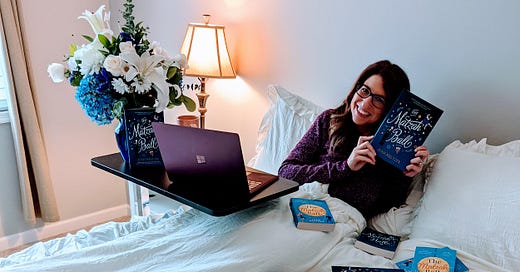Almost three years ago, my debut novel, The Matzah Ball, was published. In it, a chronically disabled and homebound Jewish woman finds love in the form of her summer camp arch enemy. It’s filled with fun and zany antics—including a woman in a Matzah Ball costume rolling down an accessibility ramp, straight into a nine-foot menorah—but also a lot of truth.
Yet, for all the honesty I type out into my books, most folks will never see the reality of my daily life. The dozens of pills I take to keep myself functioning. The fact that most nights, I struggle to sleep through pain. That I have to do everything—from showering, to taking a walk, to writing a book—with fatigue. That no matter how much planning occurs, or spoons I reserve to meet up with a friend, it always makes me worse.
I am extremely disabled by chronic illness and chronic pain.
This week’s Torah portion, Emor, deals with the laws of purity in regards to animal sacrifice and priesthood. Among these commandments, we learn that priests who have physical blemishes are forbidden from serving in the holy temple. In fact, the Torah gets very specific, eliminating everyone from those who are blind, or born with physical disabilities, to folks with a broken arm or leg.
Even if I wasn’t a disabled woman myself, my modern-day sensibilities would lead me to find this verse problematic. And so, my questions are endless.
Why can only a physically healthy person serve in the temple? Why is there no distinction between acute disabilities, such as a broken bone, and chronic ones? Also, we’re talking about God here. The dude just, literally, turned the Nile red with blood and sent a giant frog to vanquish enemies in Egypt. If He’s so upset about the physical state of one of his priests, why not just fix that person? Poof. Problem solved.
But even beyond all these things, a larger question. Why is a God whose entire brand is built around being formless suddenly so obsessed with priests being physically perfect? Talk about hypocrisy!
I spent a lot of time looking at commentator’s response to this question. The OGs—folks like Rashi and Ibn Ezra— reflect their time period’s understanding of disability. The modern ones feel more like apologetics. They say things like none of us is really perfect. Or, we’re all disabled in some form. Which, aside from never wanting to hear a healthy person say that ever that again, still doesn’t satisfy me as an answer.
Honestly, the only good response I’ve ever heard regarding disability came from my local Chabad rabbi, who upon hearing my own personal story over a holiday meal last year, quickly imparted some words of wisdom from the Lubavitcher Rebbe.
As it turns out, the Rebbe hated the word disability. He refused to use it, explaining that if a person has been deprived of a limb or a faculty, God overcompensates by giving him an ability in something else. The rebbe preferred to call it special powers.
What’s so interesting to me, thinking about what the rebbe said in relation to our current Torah portion, is how we all read the refusal to allow blemished folks the ability to work in the temple as a negative. We outright assume its because a blemish means there is something wrong with them. In a way, the text functions as a mirror for our own ableist ideas. But what if it’s the opposite? What if… one is kept from temple service, the life of a priest, because their value is much greater, and therefore, needed somewhere else.
My dear friend Maya Abrahamsson, a metastatic brain cancer survivor and host of the show, The Latest with Maya Podcast, once said, “People have a tendency to undervalue the sick and disabled.”
It’s a comment that has stuck with me since the day she uttered it. Because for so many years, when I was homebound, when I was suffering, when I disappeared from the world because of illness and disability, people gave up on me. And yet, look at what I have accomplished while I was sick.
I won an Emmy. I went to rabbinical school. I lived abroad. I found the world’s greatest husband and have been successfully married for thirteen years. I’ve written four books. Been paid to speak at places like Google. I’m the host of a podcast, and mom to a talking dog. I run a bookclub, started my own business, and HECK YES, I am the “Queen of Jewish romance.”
And for the last fourteen years, I've done most of it from home.
And that’s my takeaway from this portion. That’s my takeaway as someone who lives a life full of physical blemishes. Do not undervalue the sick and disabled. Yes, I suffer. Yes, it’s been hard. But it’s also my superpower. And if I had the choice to go back in time, make myself healthy, take this journey over again without diseases and their processes, I wouldn’t do it.
Because disability made me who I am.
Shabbat Shalom.





I love this perspective! I'm definitely going to be mulling this over the rest of the day.
“Superpower” is right! Your accomplishments in spite of/because of your debilitating conditions, are an inspiration to the rest of us! You have the gift of using those facts in such a gifted way, that you don’t come across as a constant kvetcher, or a braggart! I look forward to all of your posts! Shabbat Shalom! 🥰🔯